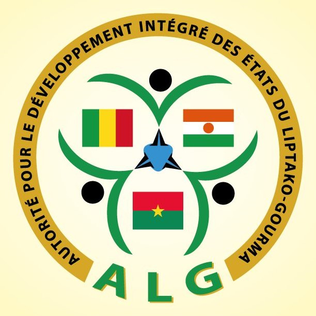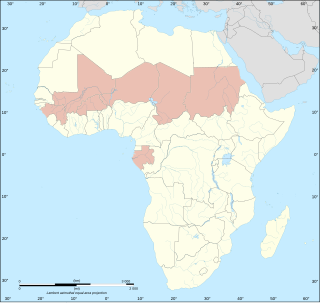
The Economic Community of West African States is a regional political and economic union of fifteen countries located in West Africa. Collectively, these countries comprise an area of 5,114,162 km2 (1,974,589 sq mi) and have an estimated population of over 424.34 million.

The Liptako–Gourma Authority is a regional organization seeking to develop the contiguous areas of Mali, Niger, and Burkina Faso.

Mohamed Bazoum is a Nigerien politician who served as the 10th president of Niger from 2021 to 2023. He assumed office in April 2021 after winning the 2020–21 presidential election and surviving a coup d'état attempt. He was ousted in the 2023 Nigerien coup d'état by members of the presidential guard and the armed forces led by Abdourahamane Tchiani.

Colonel Assimi Goïta is a Malian military officer who has been interim President of Mali since 28 May 2021. Goïta was the leader of the National Committee for the Salvation of the People, a military force that seized power from former president Ibrahim Boubacar Keïta in the 2020 Malian coup d'état. Goïta later seized power from Bah Ndaw in the 2021 Malian coup d'état and has since been declared interim president of Mali.
Events in the year 2021 in Mali.
The 2021 Malian coup d'état began on the night of 24 May 2021 when the Malian Army led by Vice President Assimi Goïta captured President Bah N'daw, Prime Minister Moctar Ouane and Minister of Defence Souleymane Doucouré. Assimi Goïta, the head of the junta that led the 2020 Malian coup d'état, announced that N'daw and Ouane were stripped of their powers and that new elections would be held in 2022. It is the country's third coup d'état in ten years, following the 2012 and 2020 military takeovers, with the latter having happened only nine months earlier.

An Islamist insurgency has been ongoing in the Sahel region of West Africa since the 2011 Arab Spring. In particular, the intensive conflict in the three countries of Mali, Niger and Burkina Faso has been referred to as the Sahel War.

A coup d'état took place in Burkina Faso on 30 September 2022, removing Interim President Paul-Henri Sandaogo Damiba over his alleged inability to deal with the country's Islamist insurgency. Damiba had come to power in a coup d'état eight months earlier. Captain Ibrahim Traoré took over as interim leader.

Ibrahim Traoré is a Burkinabè military officer who has been the interim leader of Burkina Faso since the 30 September 2022 coup d'état that ousted interim president Paul-Henri Sandaogo Damiba. At age 36, Traoré is currently the second youngest serving state leader in the world, and the youngest serving president.
Events in the year 2023 in Mali.
On 26 July 2023, a coup d'état occurred in Niger when the country's presidential guard detained President Mohamed Bazoum, and Presidential Guard commander General Abdourahamane Tchiani proclaimed himself the leader of a new military junta, shortly after confirming the coup a success.

The Coup Belt is a modern geopolitical concept and neologism which emerged during the 2020s to describe the region of West Africa, Central Africa and the Sahel that is home to countries with a high prevalence of coups d'état. After the 2023 Nigerien coup, these countries formed a continuous chain stretching between the east and west coasts of Africa.
This article lists events from the year 2023 in Niger.

On 26 July 2023, a coup d'état occurred in Niger, during which the country's presidential guard removed and detained president Mohamed Bazoum. Subsequently, General Abdourahamane Tchiani, the Commander of the Presidential Guard, proclaimed himself the leader of the country and established the National Council for the Safeguard of the Homeland, after confirming the success of the coup.
The Volunteers for the Defense of Niger is a civilian militia force to combat a potential military intervention by ECOWAS. It is on the side of Abdourahamane Tchiani and the National Council for the Safeguard of the Homeland, the ruling military junta of Niger, during the 2023 Nigerien crisis.
The ECOWAS Standby Force (ESF) is a standby arrangement made up of military, police and civilian components and which is consistent with Chapter VIII of the United Nations Charter which provides for regional peace and security arrangements. A partial legal basis is given by Article 21 of the ECOWAS Protocol Relating to the Mechanism for Conflict Prevention, Management, Resolution, Peacekeeping and Security.
Events in the year 2024 in Burkina Faso.
Events in the year 2024 in Mali.
This article lists events from the year 2024 in Niger.
The Benin–Niger Crisis is an ongoing diplomatic crisis that was triggered by the coup d'état in Niger in July 2023, which overthrew elected Nigerien President Mohamed Bazoum and installed a military junta in its place. In response, the Economic Community of West African States (ECOWAS) imposed diplomatic and economic sanctions against the new Nigerien authorities, which including border closures. Although most of these sanctions were lifted by February 2024, the ruling military maintained border closures and economic sanctions with Benin in addition to conflicts arising from illegal crossings into Benin from Niger. These in turn led to deteriorating relations and security between the two countries in addition to mutual economic downturn.









